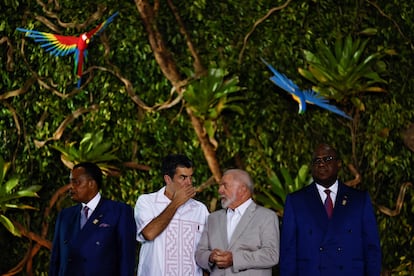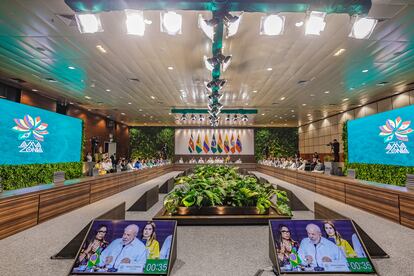Lula accuses the EU of disguising protectionist measures as environmental concern
The Brazilian president delivered a message to industrialized nations at a climate summit in Belém, arguing they should ‘pay their part so we can revive part of what was ruined’


The dozen countries that for millennia have best preserved their tropical forests — vital ecosystems for the planet to contain the climate emergency — want the industrialized nations to stop making empty promises and pull out their wallets. That is the message to the world’s wealthiest states delivered at the Amazon Cooperation Treaty Organization climate summit hosted by Brazil, whose President Luiz Inácio Lula da Silva took the opportunity to level a harsh accusation against the European Union: “Protectionist measures poorly disguised as environmental concern are not the way forward,” he declared on Wednesday at the close of the meeting with the rest of the Amazonian countries and those that are home to the world’s largest rainforests. The message was clear enough, even if Lula did not mention the EU, the EU-27 trade agreement with Mercosur or the recent European law that bans the import of products from deforested areas.
Lula insisted on the line of demanding that rich countries pay those who care for the forests, but with the additional argument of historical responsibility: “It’s not Brazil that needs money. It’s not Colombia that needs money. It’s not Venezuela. It’s nature,” the Brazilian president said, adding that the industrialized nations now need to “pay their part so we can revive part of what was ruined. Nature is in need of money.”
The new European environmental demands that Mercosur rejects have become the main obstacle to the ratification of the treaty that both blocs agreed in 2019 after two decades of negotiations. The added demands by Brussels, and a law that since May vetoes EU imports of soybeans, coffee, cocoa, or meat from illegally logged or degraded areas, has touched a nerve in Brazil and the rest of the Mercosur countries, who consider it an affront and part of what Lula defines as “green neocolonialism.”
France was also singled out. Emmanuel Macron was invited to the Belém summit as president of French Guiana, an overseas territory that is home to a small piece of Amazonia, but he did not confirm his attendance. The French president issued a tweet in which he congratulated Lula for organizing the summit, stressing that “Forests are absolutely essential in the fight against global warming and biodiversity loss,” while noting that France is “a driving force behind the European Union’s historic decision to no longer contribute to imported deforestation” — precisely the rule that has so irritated Brazil because it appears to be directed toward it.
Forests are absolutely essential in the fight against global warming and biodiversity loss.
— Emmanuel Macron (@EmmanuelMacron) August 8, 2023
But in 2022 alone, some four million hectares of primary tropical forest were lost.
We must urgently stop deforestation.
Many commitments have already been made:…
Lula remains committed to multilateralism and has advocated in Belém for “an international system to certify rainforest products.” During the current semester, Brazil presides over Mercosur and Spain holds the rotating presidency of the EU.
The Brazilian president appeared alone before the press at the close of summit, a rehearsal for the United Nations COP 30 climate conference to be held in Belém in 2025. On the closing day, the Democratic Republic of the Congo, the Republic of the Congo, and Indonesia joined the eight Amazonian countries (Brazil, Bolivia, Colombia, Ecuador, Guyana, Peru, Suriname and Venezuela), which a day earlier pledged to ensure that the Amazon does not reach the point of no return. If the world’s rainforests continue to lose trees and biodiversity, they will stop absorbing carbon dioxide and start emitting it, aggravating the climate crisis instead of contributing to a solution.
Defense of the environment and multilateralism are two of the pillars of Lula’s foreign policy, hence his insistence that the countries that are home to the valuable tropical forests unify their position and create blocs to increase their negotiating potential at the major climate summits. The President of the Republic of Congo, Denis Sassou-Nguesso, speaking from Brazil, noted the basic data on the service that his country provides to the planet: “My country represents 10% of the world’s forests and sequesters 24.5 gigatons of polluting gases. We need to increase this absorption of carbon dioxide and we need greater cooperation for this.”

One voice at the COP
As happens in so many international donor conferences, in the case of tropical forests, the millions of dollars pledged at successive summits by industrialized countries have not materialized. That is why the countries attending the Brazil summit plan to present a united front at the next COP summit in Dubai. Among other bilateral meetings, Lula met in Belém with Sultan Ahmed Al Jaber, who, as well as presiding over the COP summit in Dubai, is the executive director of the state oil company.
The indigenous people of the Amazon, often the poorest in their respective countries and with a lack of public services because of, among other reasons, the logistical challenge in providing them, feel that the developed world cares more about their trees, birds, and insects than the humans living in the six million square kilometers of forested area around the Amazon River. Their leaders are fully aware that they need to demonstrate to their compatriots that studies quantifying the potential of the bioeconomy in dollar figures translates into businesses that can be replicated on a large scale, producing cash benefits for larger sections of the population than the small producers who succeed with gourmet delicacies tailored for the international markets.
Sign up for our weekly newsletter to get more English-language news coverage from EL PAÍS USA Edition
Tu suscripción se está usando en otro dispositivo
¿Quieres añadir otro usuario a tu suscripción?
Si continúas leyendo en este dispositivo, no se podrá leer en el otro.
FlechaTu suscripción se está usando en otro dispositivo y solo puedes acceder a EL PAÍS desde un dispositivo a la vez.
Si quieres compartir tu cuenta, cambia tu suscripción a la modalidad Premium, así podrás añadir otro usuario. Cada uno accederá con su propia cuenta de email, lo que os permitirá personalizar vuestra experiencia en EL PAÍS.
¿Tienes una suscripción de empresa? Accede aquí para contratar más cuentas.
En el caso de no saber quién está usando tu cuenta, te recomendamos cambiar tu contraseña aquí.
Si decides continuar compartiendo tu cuenta, este mensaje se mostrará en tu dispositivo y en el de la otra persona que está usando tu cuenta de forma indefinida, afectando a tu experiencia de lectura. Puedes consultar aquí los términos y condiciones de la suscripción digital.








































